Otimização Semântica para IA: entendendo a nova geração de Mecanismos de Busca
Você não precisa pagar curso, mandar seu contato para especialistas que só querem os seus dados, ou ficar pulando de video para posts tentando desesperadamente entender como otimizar seu conteúdo para IAs (LLMs).
O próprio Gemini, no modelo 2.5 Pro, mostra o passo a passo da geração da informação e ali já tem as dicas que você precisa para olhar para o projeto que está otimizando e fazer os ajustes, que (SURPRESA!) já é o que falamos tem muito tempo que precisamos prestar atenção:
- Entender o Domínio do Conhecimento ou subject matter
- Tornar seu projeto relevante e gerar autoridade e reputação.
Neste artigo eu vou te mostrar o raciocínio que este modelo do Google gerou e que me inspirou a fazer esse artigo e me basearei na documentação do próprio Google para entender os conceitos de relevância, autoridade e reputação para o buscador.
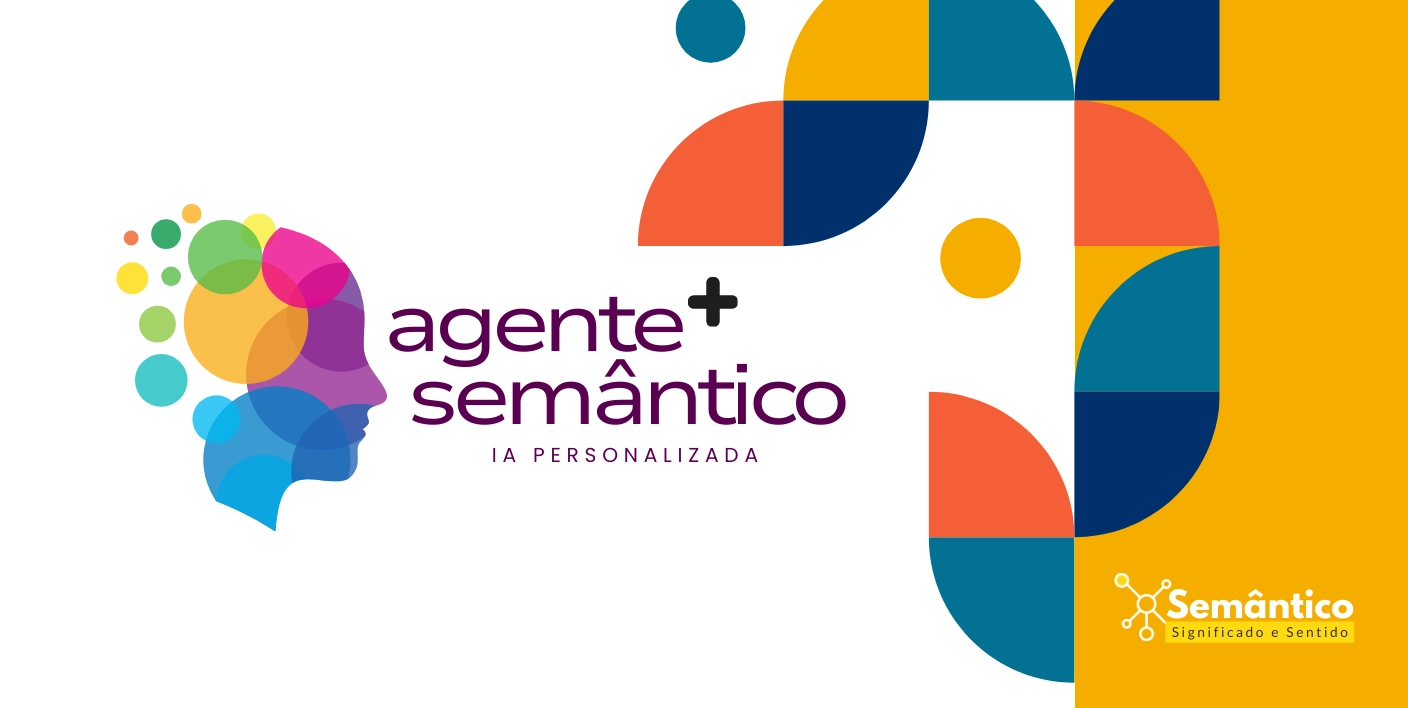
Destilando o raciocínio do Gemini para entender como “Otimizar para IA”
O processo abaixo foi extraído de uma pesquisa via voz, no aplicativo do Gemini para Android, usando o modelo 2.5 pro experimental. No processo que eu descrevo abaixo vemos os passos que o modelo gerou e quais os pontos fundamentais para encontrar fontes para gerar a resposta que eu preciso:

Agora vamos ver como as etapas usadas pelo Gemini 2.5 Pro podemos nos ajudar como ele (e talvez todos os modelos de LLMs existentes, fazem para organizar as informações e responder as nossas perguntas.
Identificar a necessidade principal
O sistema busca entender as necessidades do usuário, nesse caso a pessoa que busca, como nós fazemos na hora de criar conteúdo e informações para os nossos projetos. E já entende, na formatação da pergunta, que o usuário precisa de informações confiáveis e potencialmente diversas, citando nominalmente a necessidade de fontes de informação confiáveis.
É necessário relembrar o processo de busca de informação que é disparado pelo Gap Informacional, descrito abaixo.
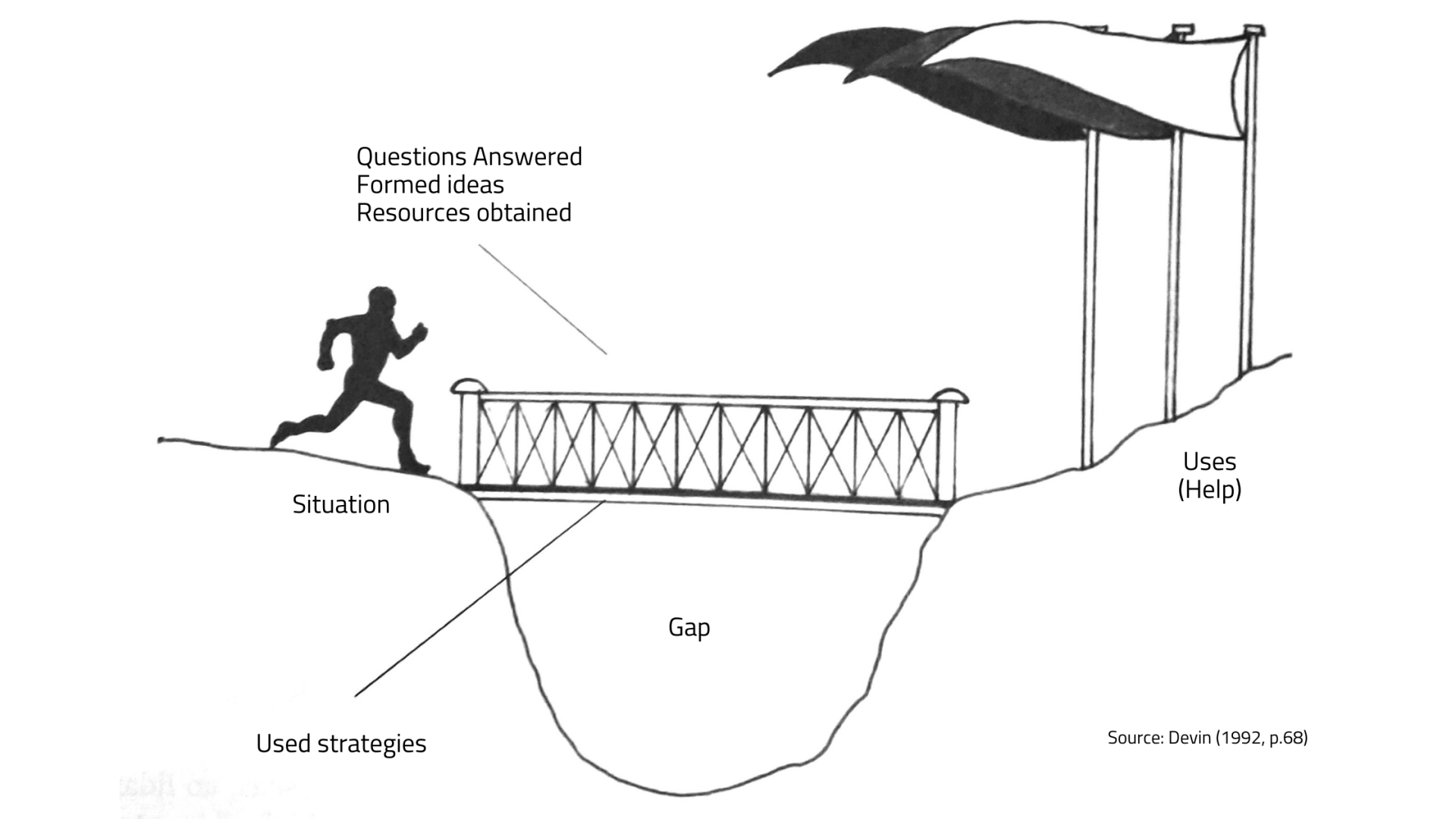
Nós estamos em uma situação de falta, onde nos falta algo para passar do estado que estamos para um novo, onde a informação adquirida nos permite suprir a necessidade inicial. Exemplos são muitos, mas imagine que você tem uma promoção no trabalho e precisa executar acompanhamentos de funcionários que estão agora subordinados a você.
Essa novidade gera a necessidade de informações de como fazer esse acompanhamento. E ela dispara o processo de busca.
Então era de se esperar que o Gemini procure identificar a necessidade principal do usuário.
Reconhecer o assunto
O sistema depois de identificar a necessidade principal do usuário, procura reconhecer o assunto que o usuário está buscando e aqui temos uma dica valiosa sobre um assunto sobre o qual eu sempre falo: definir o domínio do conhecimento ao qual o seu projeto pertence, identificar os assuntos relacionados e permanecer fiel a essa escolha.
Isso é importante porque estamos lidando com algoritmos, LLMs, sistemas automatizados, todos com dificuldades em entender a linguagem humana e suas nuances. Aqui no blog você encontra vários conteúdos onde eu falo sobre ambuiguidade e semântica, que vão lhe ajudar a entender a necessidade de definir os assuntos tratados e não abrir demais o escopo do seu conteúdo.
Formular consultas de pesquisa
Esse é um processo de pensamento interno que é traduzido para o uso real da ferramenta de busca, no caso aqui, o Google Search. No print você consegue perceber que o Gemini procura por sites relevantes e faz uma pesquisar por termos relacionados, gerando uma lista destes termos.
Como ele anteriormente reconhece o assunto, me leva a entender que o grafo de conhecimento do Google pode estar sendo usado aqui para montar a estratégia de busca dos termos relacionados ao assunto principal e dos assuntos relacionados a ele.
Essa é uma estratégia muito próxima da usada por um bibliotecário quando auxiliar a uma pessoa que procura ajuda na biblioteca a encontrar um livro que possa responder a uma dúvida sua.
Executar a pesquisa (usando a ferramenta)
Depois ele gera o comando:
Gerar o bloco tool_code com as consultas selecionadasE faz uma busca no Google, assim como todos nós. Então quando falamos das novas versões do Gemini e todo os outros LLMs que acessam a Web para melhorar a geração da informação podemos afirmar com um grau alto de certeza de que as estratégias que contribuem para o melhor entendimento de um conteúdo com o objetivo de indexá-lo e recuperá-lo continuam valendo a partir desta fase do raciocínio de um LLM.
Analisar os resultados da pesquisa
Aqui o sistema simula, com base nos resultados esperados, os resultados da pesquisa que provavelmente apontarão para vários tipos de recursos que podem ser organizados para gerar a resposta a minha pergunta.
Sabemos que o sistema faz uma simulação do resultado da pesquisa, sugerindo que a busca no Google é uma simulação (baseada nos embeds da base do LLM?) que gera um resultado de pesquisa sintético, com forte base probabilística (pesquisa que provavemente apontará) para recursos, que podem ser sites, livros, vídeos, artigos acadêmicos e outros tipos mais.
O próximo item fecha a questão sobre a suposição da simulação de busca e do resultado sintético montado através desta simulação.
Sintetizar as descobertas e estruturar a resposta
Aqui temos o maior volume de dicas sobre as estratégias que o Gemini usa.
- Priorizar a Autoridade: Começar com as fontes mais oficiais e com orientação científica.
- Segundo o tipo de busca o sistema é orientado a selecionar algumas categorias de fontes bem específicas.
- Apresentar Portais de Informação: Mencionar portais confiáveis.
- Por conta da natureza da minha pergunta (envolvendo temas relacionados a saúde) o sistema toma precauções quanto a confiabilidade dos portais acessados, indicando que alguns portais são selecionados e marcados como confiáveis.
- Considerar Associações de {assunto}
- Novamente uma estratégia de agrupamento semântico, criando associações do assunto principal, talvez para expandir a busca ou até mesmo testar novas abordagens.
- Personalizar (sutilmente): Onde o Gemini usa meu perfil para personalizar as respostas para mim.
- Aqui vai o ponto em que a funcionalidade presente em versões pagas dos LLMs diferem das versões gratuítas. Eu consigo criar um perfil meu e deixar salvo na ferramenta, que sempre vai personalizar a busca conforme o que eu informei a ele sobre mim.
- Oferecer assistência adicional: Perguntar se o usuário tem aspectos específicos de {assunto}.
- Outra diferença extrema entre a recuperação da informação e geração de informação: a possibilidade do sistema ter memória e incitar uma conversa que expanda o assunto ou aborde novos aspectos.
- Refinar a linguagem: Garantir que a linguagem seja clara, direta (de acordo com a preferência do usuário) e que use terminologia apropriada em português. Use Markdown para estrutura (marcadores).
- Outro aspecto de personalização, a adaptação da linguagem ao meu perfil descrito na plataforma por mim e o formato de saída organizado para leitura humana, usando uma estrutura que facilita varrer a resposta.
No documento Search Quality Evaluator Guidelines do Google você consegue saber o que relevância, autoridade e reputação significa para o Google.
Com base nas Diretrizes para Avaliadores de Qualidade da Pesquisa, a relevância, a autoridade e a reputação desempenham papéis cruciais na forma como o Google avalia a qualidade dos resultados de pesquisa. Esses conceitos estão intrinsecamente ligados ao objetivo de fornecer aos usuários informações úteis e confiáveis.
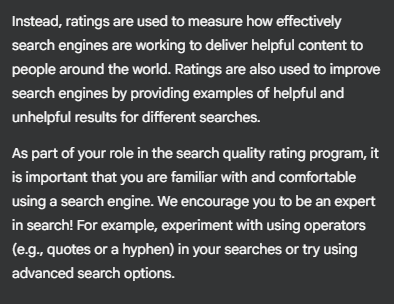
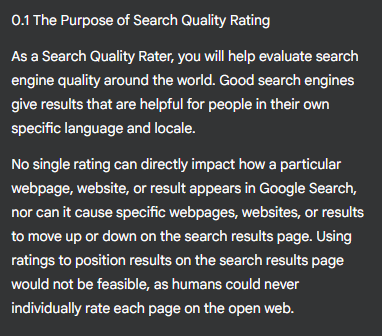
Prints da documentação oficial do Google que orienta os analisadores de qualidade de buscas.
O que significa Relevância para o Google?
A relevância é fundamental para determinar se um resultado de pesquisa atende às necessidades do usuário3 . As diretrizes enfatizam que os avaliadores devem focar nas necessidades do usuário e avaliar o quão útil e satisfatório um resultado é para a consulta específica3 . Uma consulta pode ter múltiplas interpretações e intenções do usuário, e os resultados devem ser relevantes para a interpretação dominante, comum ou mesmo uma interpretação minoritária razoável .
A escala de avaliação “Needs Met” (Necessidades Atendidas) varia de “Fully Meets” (Atende Completamente) a “Fails to Meet” (Falha em Atender). Um resultado que é completamente fora do tópico para a consulta ou aborda uma interpretação improvável da consulta é classificado como “Fails to Meet”. Por outro lado, um resultado muito útil para qualquer interpretação dominante, comum ou menor razoável da consulta/intenção do usuário é classificado como “Highly Meets”6 .
A relevância não se limita apenas à correspondência de palavras-chave. Os avaliadores são instruídos a usar o bom senso e a pesquisa na web para entender a consulta e a intenção do usuário. Eles devem considerar se pessoas em diferentes locais ou com diferentes contextos poderiam estar procurando por algo diferente com a mesma consulta4 . Além disso, a relevância pode mudar com o tempo, pois o significado das consultas pode evoluir.
Em suma, a relevância garante que os resultados apresentados pelo Google sejam úteis e correspondam ao que o usuário está procurando, seja uma informação específica, um site, um produto ou um local físico
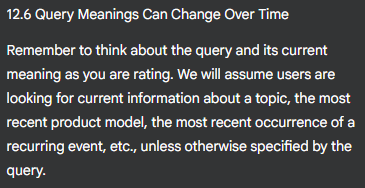
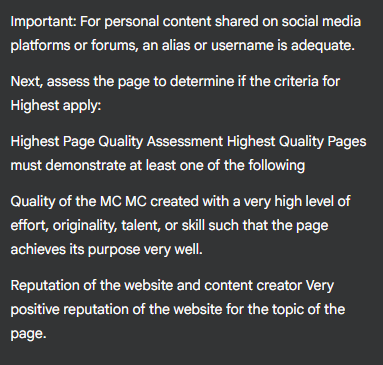
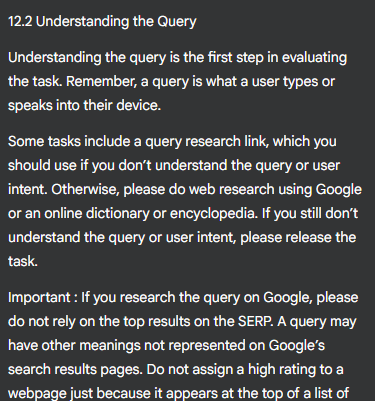
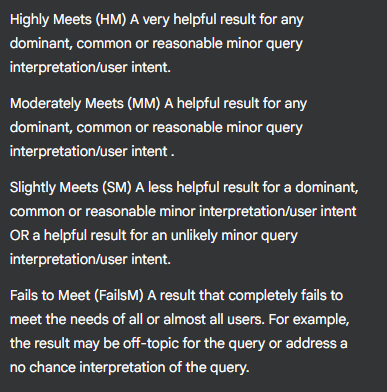
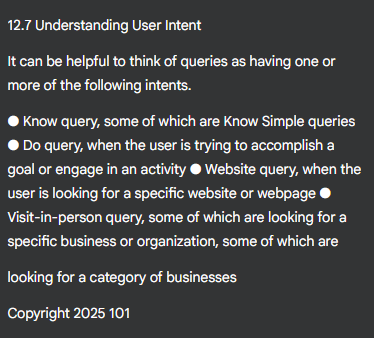
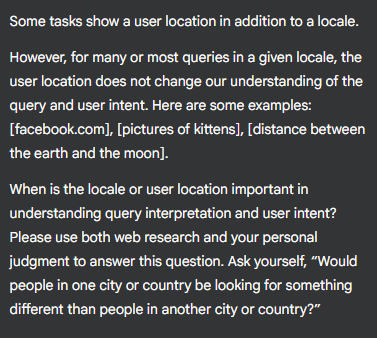
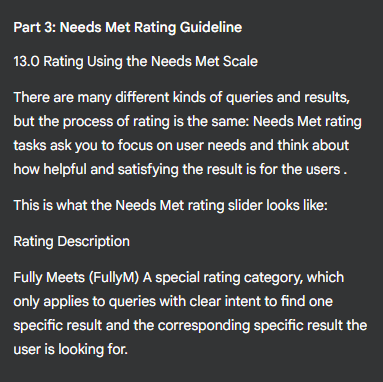
Prints da documentação oficial do Google que orienta os analisadores de qualidade de buscas.
O que significa Autoridade para o Google?
A autoridade é um componente essencial do conceito de E-E-A-T (Experiência, Expertise, Autoridade e Confiabilidade), que é um dos pilares da avaliação da qualidade da página. A autoridade refere-se ao grau em que o criador do conteúdo ou o site é reconhecido como uma fonte de referência sobre um determinado tópico.
As diretrizes explicam que, embora a maioria dos tópicos não tenha um único site ou criador de conteúdo “oficial” e autoritário, quando existe, essa fonte é frequentemente uma das mais confiáveis . Exemplos incluem a página oficial do governo para renovação de passaportes ou o perfil de uma empresa local nas redes sociais como fonte autoritária para informações sobre promoções atuais .
Para tópicos YMYL (“Your Money or Your Life” – Seu Dinheiro ou Sua Vida), a autoridade do site deve ser julgada pelo que especialistas na área têm a dizer. Recomendações de fontes especializadas, como sociedades profissionais, são fortes evidências de reputação positiva e, por extensão, de autoridade.
Ao avaliar a autoridade, os avaliadores devem considerar se o criador do conteúdo possui o conhecimento ou habilidade necessários para o tópico. Diferentes tópicos exigem diferentes níveis e tipos de expertise para serem considerados confiáveis. A autoridade contribui significativamente para a confiabilidade geral de uma página. Um site ou criador de conteúdo autoritário é visto como uma fonte “go-to” para informações sobre aquele tópico, o que aumenta a probabilidade de o conteúdo ser preciso e útil.
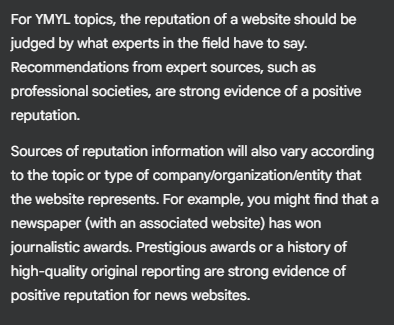
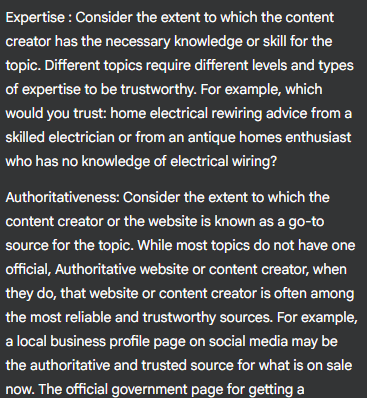
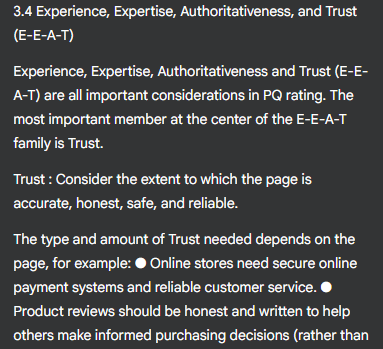
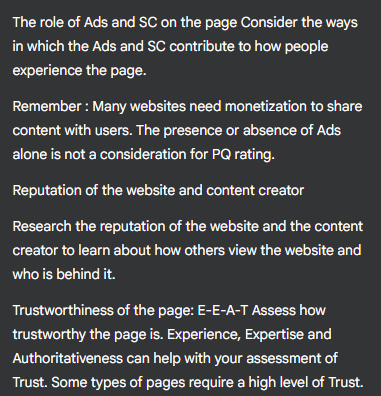
Prints da documentação oficial do Google que orienta os analisadores de qualidade de buscas.
O que significa Autoridade para o Google?
A reputação do site e dos criadores de conteúdo é outro fator crucial na avaliação da qualidade da página. As diretrizes instruem os avaliadores a pesquisar a reputação usando fontes externas e independentes. Isso inclui procurar artigos de notícias, referências, recomendações de especialistas e outras informações credíveis escritas por pessoas sobre o site ou o criador do conteúdo.
A pesquisa de reputação deve ser realizada de acordo com o tópico da página. Um site pode ser uma fonte confiável para um tipo de conteúdo (por exemplo, vídeos engraçados), mas não confiável para outro (por exemplo, informações financeiras).
As avaliações de clientes também são importantes para avaliar a reputação de lojas, empresas ou qualquer site que ofereça produtos ou serviços. Um grande número de avaliações positivas e detalhadas de usuários pode ser considerado evidência de reputação positiva. Por outro lado, relatos credíveis de fraude ou má conduta financeira indicam uma reputação extremamente negativa.
A reputação é especialmente importante para detectar sites e criadores de conteúdo não confiáveis. Mesmo que o conteúdo pareça bom superficialmente, a pesquisa de reputação pode expor golpes, fraudes ou outros sinais de dano. Uma reputação extremamente negativa de um site ou criador de conteúdo pode levar à classificação da página como “Lowest” (Mais Baixa), pois muitos usuários considerariam o site ou a página não confiável.
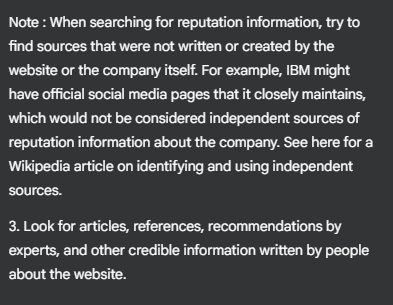
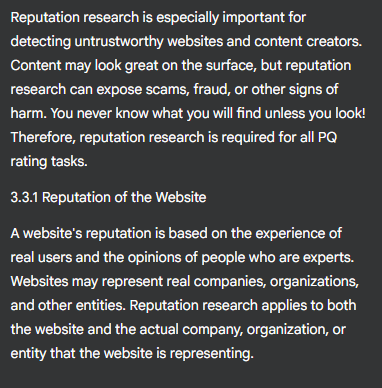
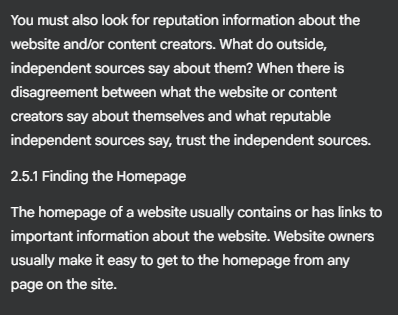
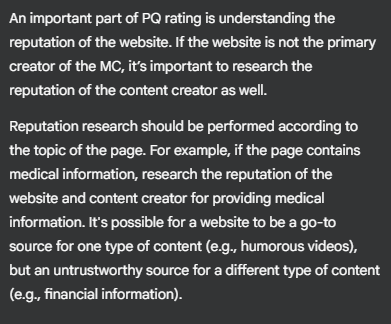
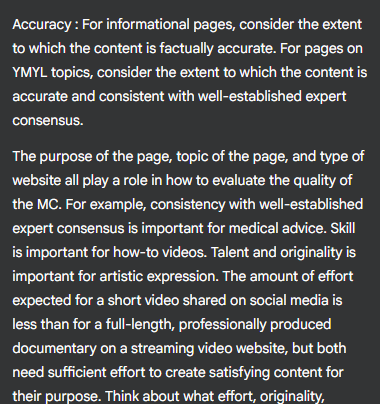
O que isso significa para os projetos que eu otimizo?
Em resumo, a reputação ajuda o Google a entender como outros percebem um site ou um conteúdo em específico, contribuindo para a avaliação geral da confiabilidade e qualidade da informação.
Em conjunto, relevância, autoridade e reputação são elementos fundamentais para os avaliadores de qualidade da pesquisa, que utilizam destes critérios para ajudar o Google a refinar seus algoritmos. Ao identificar conteúdo relevante, de fontes com autoridade e com boa reputação, o Google busca oferecer aos usuários a melhor experiência de pesquisa, segundo eles dizem.
Mas uma coisa é certa, oferecer respostas com informações precisas, confiáveis e que atendam às suas necessidades é o caminho para ter usuários satisfeitos com a ferramenta.
Mas o que eu quero lhe dizer é que não é necessário mudar o jeito que você chama o SEO, nem cair de cabeça em qualquer novidade que vemos algum guru ou empresa tentando nos vender. É preciso entender como as ferramentas funcionam, mudar o conceito sobre práticas antiquadas e fazer muitos testes. Talvez quando a busca for 100% gerada por LLM algumas coisas mudem totalmente, talvez quando tudo o que sobrar forem agentes que conversam com outros agentes e nós só enviamos um problema e recebemos a solução, vamos precisar nos reinventar completamente, mas por enquanto vou manter a minha calma, estudar e testar muito.
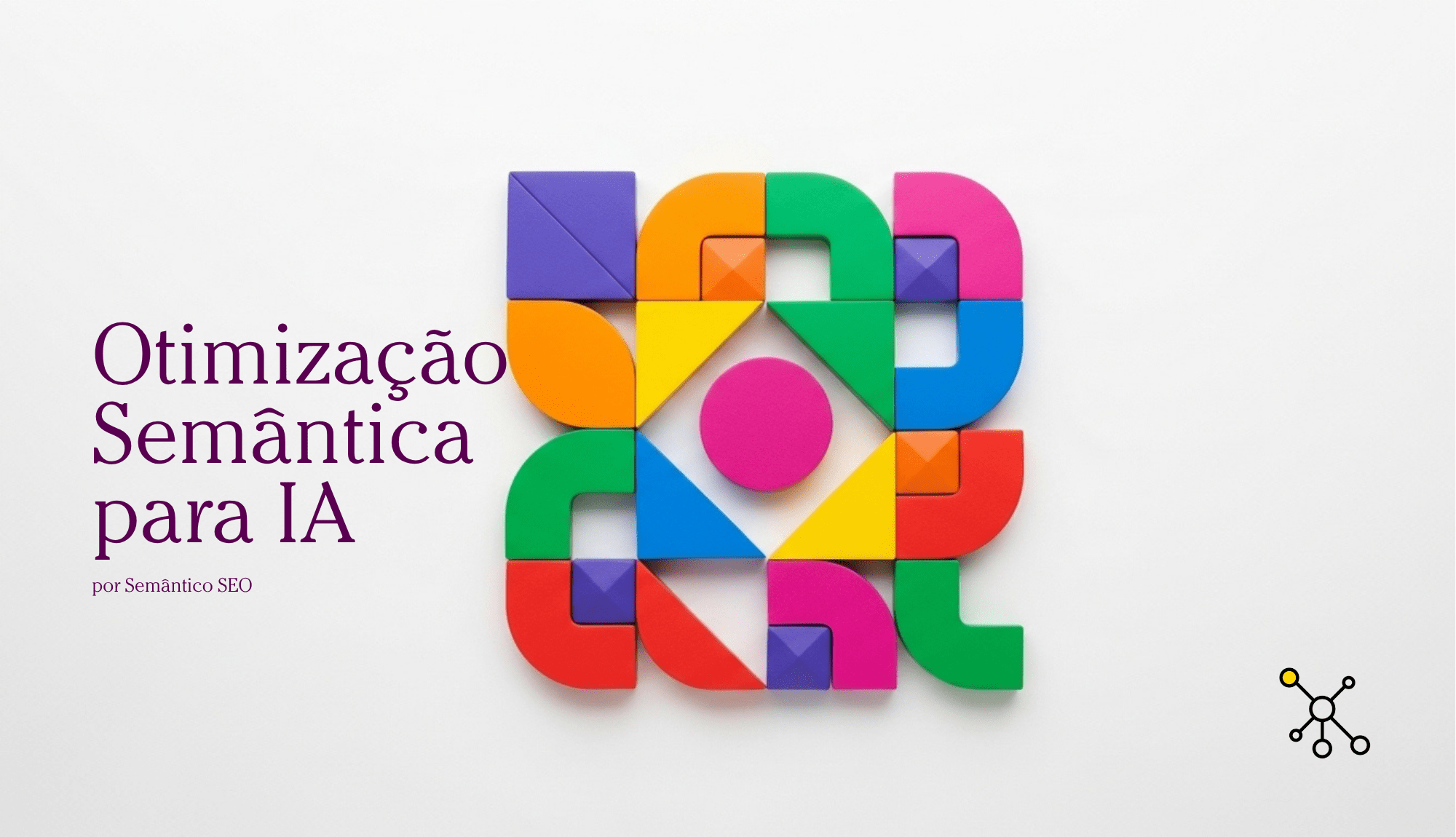




Publicar comentário